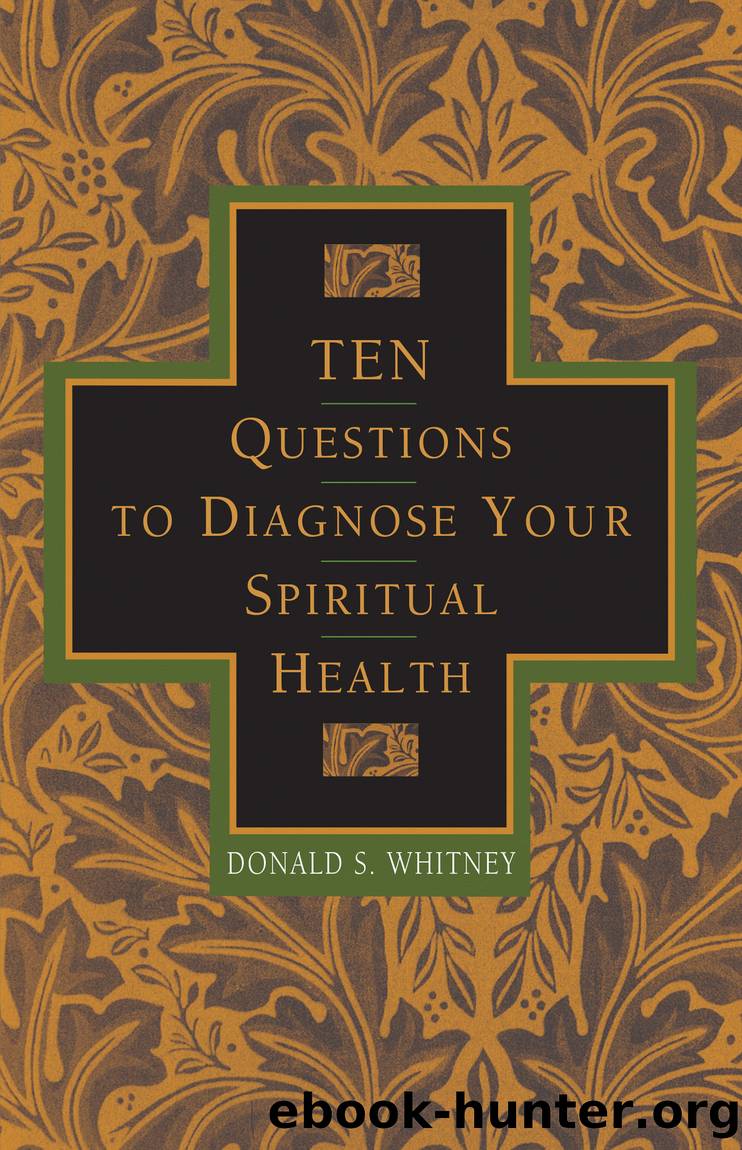Ten Questions to Diagnose Your Spiritual Health by Donald Whitney

Author:Donald Whitney
Language: eng
Format: epub
Tags: RELIGION / Christian Life / Spiritual Growth
Publisher: The Navigators
Published: 2001-05-04T00:00:00+00:00
JESUS THE NEED-MEETER
Jesus Christ, the ultimate need-meeter, reflected the ânear-balanceâ of filling spiritual as well as temporal needs. He laid aside His heavenly privileges and came to earth for the expressed purpose of meeting our greatest need. As He put it, âI have come that they may have lifeâ (John 10:10).
The supreme need of every human is a spiritual one. Because we have all willingly sinned by breaking the laws of God (Romans 3:23) and have done so an infinite number of times, we face physical death (Romans 6:23), judgment (Hebrews 9:27), and the second death of eternal punishment (Revelation 21:8). But âChrist was offered once to bear the sins of manyâ (Hebrews 9:28). He came to provide the only hope of escape âfrom the wrath to comeâ (1 Thessalonians 1:10). Jesus said of Himself, âI am the door. If anyone enters by Me, he will be savedâ (John 10:9). To all who do come to Him in repentance and faith (Mark 1:15) Jesus promised, âI give them eternal lifeâ (John 10:28). Jesus Christ came to offer Himself as the door to life in the next worldâan incomprehensibly glorious and joyous life without comparison or end. Life with God Himself.
While His primary purpose was to meet our eternal need, He was not oblivious to peopleâs temporal needs. His method of accomplishing both aims is perfectly demonstrated in the account recorded in Mark 6:34-44. âAnd Jesus, when He came out, saw a great multitude and was moved with compassion for them, because they were like sheep not having a shepherd. So He began to teach them many thingsâ (verse 34). His compassion for their hopelessness prompted Him to teach them truth from Heaven. Then, after feeding their souls, He fed their hungry stomachs in what is known as the miracle of the feeding of the five thousand.
If we saw people from Jesusâ perspective, we would begin to see them as âsheep not having a shepherd.â Even though many do not feel themselves to be in such a condition, they are. Even if they appear to have no temporal needs, they certainly have spiritual needs. They may appear as self-sufficient as the hardened atheist Madalyn Murray OâHair once did. But deep within they are often like her when she wrote at least a half-dozen times in her diary the plea, âSomebody, somewhere, love me.â[2] Everyone is needy, no matter how thick his or her veneer of self-sufficiency. The one universal common denominator is that everyone has spiritual needs, chief of which is the need for Jesus, the soul-shepherd.
No one who is indwelled by the Spirit of Jesus can remain unfeeling toward either the temporal or the spiritual needs of others made plain. Growth in Christlikeness involves perceiving those needs sooner than before, and not just when they become obvious to everyone. Increased growth in Christian maturity is revealed by a heartfelt compassion toward people, not a perfunctory, merely external response. There is no Christlikeness in throwing money at a physical need or
Download
This site does not store any files on its server. We only index and link to content provided by other sites. Please contact the content providers to delete copyright contents if any and email us, we'll remove relevant links or contents immediately.
| Adult Ministry | Children's Ministry |
| Counseling & Recovery | Discipleship |
| Evangelism | Missions & Missionary Work |
| Preaching | Sermons |
| Youth Ministry |
Victory over the Darkness by Neil T. Anderson(2862)
The Rape Of Nanking by Iris Chang(2813)
Chosen by God by R. C. Sproul(2161)
Habits of Grace by David Mathis(1976)
Crash the Chatterbox by Steven Furtick(1974)
Knowing God by J.I. Packer(1854)
How To Be Born Again by Billy Graham(1778)
A Prophet with Honor by William C. Martin(1718)
Gospel-Shaped Marriage by Chad van Dixhoorn(1716)
Peace with God by Billy Graham(1683)
Confronting Christianity by Rebecca McLaughlin(1589)
God's Smuggler by Brother Andrew(1542)
Angel Dreams by Virtue Doreen Virtue Melissa(1476)
Whisper by Mark Batterson(1452)
The School of Biblical Evangelism by Ray Comfort(1437)
Missionaries by Norman Lewis(1427)
The Truth War by John MacArthur(1423)
The Poems of Rowan Williams by Rowan Williams(1355)
Do Greater Things by Robby Dawkins(1324)
